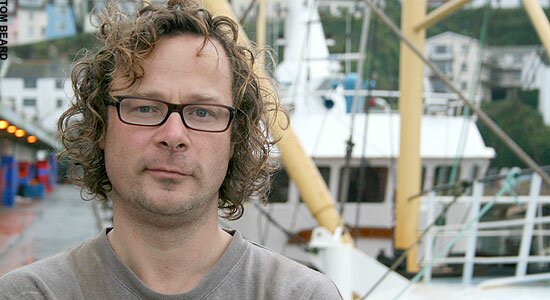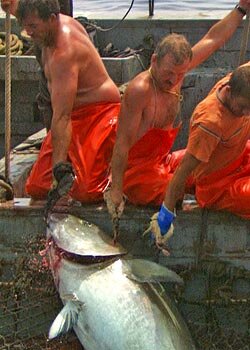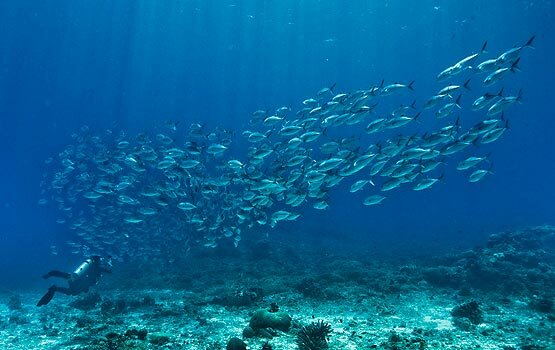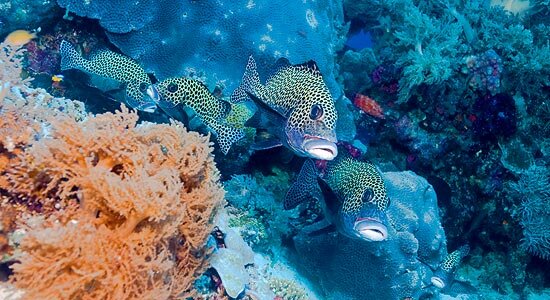Author Archive for Editor
This week saw lots of coverage of Nobu’s decision to leave bluefin tuna on their menus, but to include a suggestion that diners choose a sustainable alternative.
The story featured on The Guardian’s Word of Mouth blog, where Jay Rainer labelled it “indefensible idiocy”.
The Telegraph, The Independent, The Daily Mail and This is London carried the story with all mentioning Charles Clover’s book and the film.
This is London followed up their coverage with an opinion piece by Charles Clover, where he said: “[Nobu] is participating in the extermination of a species.
“And when his celeb clientele finally understand that this is wrong, they will turn their backs on his restaurants, never to return.”
Coverage of The End of the Line increased with two articles appearing on The Telegraph. It ran a story on Ted Danson’s endorsement of the film and a review, with both including video clips.
Continue reading ‘Nobu leave bluefin tuna on menu, but add warning’

The End of the Line has been cropping up on blogs and news sites, and is receiving some very positive feedback.
Recent comments on the film and the campaign have appeared on the Washington Post, California Chronicle, Spear’s WMS (Wealth Management Survey) and Whole Food Market’s blog. Here is a round-up of the coverage the film is receiving.
Charles Clover answers questions about the film and it’s message for the Washington Post’s All We Can Eat food blog.
Asked whether it is too late to save the oceans, he replies: “No. But part of the problem is that people still believe we live in a world of plenty. The world of plenty in terms of fish disappeared in 1988, and we haven’t caught up with that fact yet.”
He goes on to deal with the issue of farming carniverous fish: “It takes five pounds of little fish to grow one pound of salmon. And actually those fish, like Peruvian anchoveta and blue whiting, eat very nicely. So why don’t we eat the little fish?”
In an opinion piece for Spear’s WMS, William Sitwell, Editor of Waitrose Food Illustrated, writes: “While those in the food world and others who know and care about the plight of depleting fish stocks have been talking about this for ages, sometimes you need to get something onto the telly to get people to pay attention.”
Whole Story, the Whole Foods Market blog, has a review by Carrie Brownstein, which has generated some debate amongst readers. She says: The film begins with beautiful footage of marine life and quickly (and graphically) moves toward its key message: The oceans are overfished and fish populations are in trouble.”
John Mitchell, writing in the California Chronicle, considers the the social implications of the need to curb overfishing:
“One of the most fascinating passages of the film . . . takes a look at the coast of Africa, which is being overfished by foreign - specifically European - boats. This has decimated not only the sea but also the livelihood of local fishermen, who now have nothing to catch.
“Colonialism is dead officially, but its ghost continues forward in the form of sucking up resources - the fish depletion is a direct contributor to the current pirate problem that’s making the headlines, pushing once-working fishermen into a life of crime in retaliation.”
What saddened Amanda Rappak the most, in the Green Living blog, was the inability of governments to “penetrate the complex fish market system with effective enough controls that would actually limit how much fish is caught”.
She also highlighted the film’s positive message: “The film offers avenues for taking action with its campaign, and so does Greenpeace. But it seems the first step to change would begin with a personal pledge to always knowing exactly where your food comes from and how it reached your plate.”
The Enviro blog at Huck Magazine cites the support the film is getting: “The film which was selected for the Sundance Film Festival this year has gathered international support from organisations such as WWF, and well known faces such as broadcaster Hugh Fearnley-Whittingstall, also offers simple solutions we can all adapt to help prevent such a tragic future.”
Writing in the 1Click2Fame blog, Annabel Harrison says: “After watching the film, I realised that we should be doing so much more to protect what is one of the biggest natural sources of food for humans. The positive aspect of this global issue is that it’s not too late – there is plenty we can do to make sure that species don’t become extinct.”
On her blog, Regency Life in the 21st Century, Kimba writes : “We forget that these waters are also our to maintain, protect, and sustain. How? By eating only sustainable seafood. By helping politicians understand there needs to be protected areas where fishing is illegal. By getting the word out! There is a great new book and film “The End of the Line” that will tell you more.”

Hugh Fearnley-Whittingstall, writer, broadcaster, campaigner and advocate of seasonal and ethically-produced food has offered his support for The End of the Line.

Hugh Fearnley Whittingstall has offered his support for The End of the Line film and campaign
With co-author Nick Fisher, he wrote The River Cottage Fish Book. Hugh says the aim of the book was “to empower you, the consumer, to make choices which will genuinely help to reverse the decline in our native fish stocks.”
He is currently filming for the new series of River Cottage which begins on Wednesday 3rd June on Channel 4.
In the next edition of the River Cottage newsletter, Hugh writes:
“You may well have heard of Charles Clover’s excellent and eye-opening book, The End of The Line, which deals with the far-reaching effects of over-fishing in our seas. Continue reading ‘Hugh Fearnley-Whittingstall supporting The End of the Line’

Charles Clover, author of The End of the Line and one of the stars of the film, has talked to Fork in the Road, the food blog for Village Voice in New York.
He outlines his concerns about overfishing, the solutions that are currently in place and why we shouldn’t assume we live in a world of plenty. He also talks about whether he eats fish, he says:
“Yes, but less than I did. I am mightily confused by whether any farmed fish is sustainable and I would just prefer to eat the little fish that they feed to carnivorous fish . . . . I like mackerel, which is now MSC-certified, and have learned that it makes wonderful sushi straight out of the sea with English mustard, as Hugh Fearnley-Whittingstall serves it.”
To read the full interview see No Fish by 2048? The End of the Line–Interview with Journalist Charles Clover on the Fork in the Road on Village Voice.

The UK cinema release of the film is being supported by retailer Waitrose, which has a long term commitment to responsible fish sourcing.
The retailer launched its Responsible Fishing Policy 12 years ago, which includes a complete ban on any threatened species and on damaging fishing methods such as beam trawling.
All its fish are from sustainable wild sources or, if farmed fish, from responsible farming systems. Mark Price, Waitrose managing director, said:
To support the launch of such an important film was an absolute must for Waitrose. With many species on the brink of extinction there has never been a more pressing need to bring this issue to the fore. The End of the Line shows that we can all enjoy fish, but encourages viewers to think more carefully about where their fish is coming from.”
To find out more about Waitrose’s policies go to: www.waitrose.com/food/productranges/fish.aspx

With concern over bluefin tuna stocks growing among environmental groups, we round up the latest news at the start of the Mediterranean bluefin tuna fishing season.

A large tuna is caught by fishermen
Reuters report that a new WWF report says overfishing is set to wipe out bluefin tuna in three years.
The news agency says: “Overfishing will wipe out the breeding population of Atlantic bluefin tuna, one of the ocean’s largest and fastest predators, in three years unless catches are dramatically reduced, conservation group WWF said.
“As European fishing fleets prepare to begin the two-month Mediterranean fishing season, WWF said its analysis showed the bluefin tuna that spawn - those aged four years and older - will have disappeared by 2012 at current rates.”
Sergi Tudela, head of fisheries at WWF Mediterranean, said: “For years people have been asking when the collapse of this fishery will happen, and now we have the answer.” Continue reading ‘Bluefin tuna fishing season starts in the Mediterranean’

One of the world’s rarest sharks has been eaten after being accidentally caught in fishing nets in south-east Asia.
Only 40 other sightings of the shark have ever been recorded, according to the World Wildlife Fund.
The 500kg, four metre megamouth shark died while struggling in the fishermen’s net on 30 March off Burias island in the central Philippines. Read more at Guardian Environment.

Supermarket giant Sainsbury’s has re-named a type of fish Colin because customers are too embarrassed to ask for pollack.
The chain is promoting the seafood in the run up to Easter, as it tastes similar to cod and is more sustainable.
But instead of the English name, it will be called Colin - the French word for hake, another member of the cod family. Read more at Telegraph Earth

EU: sharks now need protection from overfishing from The Times
It could spell the end of rock salmon or huss being sold at the chip shop. The European Commission, presenting its first plan to limit all types of shark fishing, has said that it had to act to stop several types of shark being pushed towards extinction. Read more . . .
‘Google Ocean’ launched as extension of Google Earth to map the seabed from The Telegraph
Google Ocean, which will be included in the newest version of Google Earth, will allow users to swim around underwater volcanoes, watch videos about exotic marine life, read about nearby shipwrecks, contribute photos and watch unseen footage of historic ocean expeditions - all from the comfort of their homes. Read more . . .

Vessels catching mackerel around the Scottish coast have been awarded certification by the Marine Stewardship Council, recognising that their landings are from well-managed stocks.
This follows the certification of North Sea herring last year as a well managed stock that people can eat without fear that they are destroying the stock or destroying other species as by-catch.
The Scottish Pelagic Sustainability Group is responsible for Scotland’s largest individual catches of fish. They landed 95,700 tons of mackerel in 2007. Smoked, frozen and fresh mackerel will soon be on sale bearing the MSC logo meaning that it can be traced back to the independently certified SPSG fishery.
John Goodlad, chairman of the Group, said: “This is another defining moment for the Scottish pelagic industry as it establishes its environmentally responsible credentials.”
Continue reading ‘Eco-label awarded to UK mackerel fishery’

The overfishing of the oceans is contributing to global warming, scientists have found.
They have discovered that the ocean’s ability to absorb pollution and purify the atmosphere is influenced by an unexpected factor – fish droppings.

Alkaline chemicals such as calcium carbonate from fish poo can help balance this acid and help to take carbon dioxide out of the atmosphere
The increase in carbon dioxide in the atmosphere not only drives global warming, but also raises the amount of CO2 dissolved in ocean water, resulting in the sea becoming more acid and potentially a threat to sea life.
Alkaline chemicals such as calcium carbonate can help balance this acid and help to take carbon dioxide out of the atmosphere.
Scientists previously thought the main source for this balancing chemical was the shells of marine plankton, but they were puzzled by the unexpected quantities of carbonate in the top levels of the water.
Continue reading ‘Fish poo could save the planet’

US domestic trade legislation could be used to save the Atlantic bluefin tuna after the failure of an international body to restrict rampant over-fishing of the endangered species.
Conservationists and concerned scientists are discussing applying for a US import ban after a UN-recognised body set up to manage Atlantic and Mediterranean tunas awarded fishermen a total allowable catch in excess of what scientists recommended amid warnings that the stock could collapse.
Member nations of the International Commission for the Conservation of Atlantic Tunas awarded fishermen in the Mediterranean and Eastern Atlantic a quota of 22,000 tons this year against a scientific recommendation of 8,000-15,000 tons.
The United States is now a net importer of bluefin tuna, which would mean import restrictions against fish caught and ranched in the Mediterranean could have an effect on reducing international trade and placing pressure on other nations to follow suit.
Options being discussed by conservationists include a listing under the US Endangered Species Act and a listing under Appendix II of the Convention on International Trade in Endangered Species (CITES), which restricts trade in caviar and elephant ivory, but both of these would be hotly opposed by fishermen and fishing nations.
A resolution by the UN general assembly to reduce catches of bluefin tuna is another option under consideration.
Andrew Sharpless, executive director of Oceana, said: “ICCAT has shown that its true name is I CAN’T. It can’t find the courage to save the bluefin tuna from being commercially hunted and killed to where it is in danger of disappearing forever. Continue reading ‘US trade embargo could save bluefin tuna’

Fishing skippers, owners and an auctioneer in the port of Newlyn, England, have been convicted of deliberately overfishing protected fish stocks for financial gain and ordered by a judge to pay £190,000 in fines with more to come.
Six skippers, an owner and an auctioneer were convicted of a total of 114 specimen charges of fraudulently selling illegally-caught protected stocks such as cod and disguising them as non-quota species which could be landed legally.
The number of charges brought, and the decision by inspectors to investigate the activities of a whole port are thought to make this the biggest case ever brought by the British government involving “black” fish. Continue reading ‘Cornwall rocked by massive fraud over selling ‘black’ fish’

George Bush has designated 200,000 square miles of the Pacific as conservation areas in a bid to re-write his conservation reputation before he leaves office.

Mr Bush, who has steadfastly refused to impose statutory limits on carbon dioxide emissions to combat global warming, became the leader who has protected more of the oceans than anyone else in the world.
The areas protected, with the active intervention of the First Lady, Laura Bush, include pristine coral reefs, the habitat of vanishing marine species, and the deepest place on Earth, the Mariana Trench. Continue reading ‘George Bush designates marine reserves the size of Texas as one of last acts as president’

![]()






